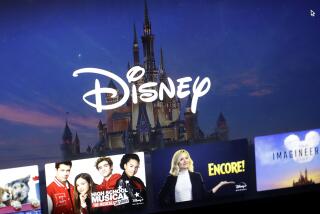Hollywood looks to another box office record as movie attendance remains lackluster
The muscle-bound superheros of the multiplex are expected to lift the domestic box-office to a projected $11.3 billion in ticket sales for 2016 — which is a record sum but a modest 1.5% increase from last year’s haul of $11.14 billion.
The Walt Disney Co. once again dominated the competition, thanks to Pixar’s “Finding Dory” and Marvel’s “Captain America: Civil War,” which are projected to take the Nos. 1 and 2 box-office spots, respectively.
The studio also saw massive hits with “The Jungle Book,” “Zootopia” and the last two “Star Wars” releases: “Star Wars: The Force Awakens” and “Rogue One: A Star Wars Story.”
“The Force Awakens” opened late last year but earned $736.6 million of its $2-billion global total in the current calendar year, said the studio.
For 2016, Disney is expected to gross more than $2.89 billion domestically, according to data from comScore. The studio said it has already surpassed the $7-billion mark worldwide for the year.
Warner Bros. is the second-best performing studio at the domestic box office, with about $1.88 billion in ticket sales this year, thanks to the superhero blockbusters “Batman v Superman: Dawn of Justice” and “Suicide Squad,” which both surpassed $300 million domestically.
The studio also had a hit with the “Harry Potter” spin-off “Fantastic Beasts and Where to Find Them.”
But movie attendance continues to languish across the country. Attendance is projected to be essentially flat compared with last year, with cinemas seeing an increase of just half of 1% from 2015, lifting attendance to just above 1.3 billion moviegoers, according to comScore.
Indeed, 2016 was far from a banner year for Hollywood. The industry continues to deal with young audiences staying away from cinemas in favor of streaming media.
“It’s not a lot of growth,” said Paul Dergarabedian, senior media analyst at comScore.
Domestic attendance reached 1.6 billion moviegoers in 2002 and dropped off in subsequent years. In the last three years, attendance has hovered around 1.3 billion annually.
“The leisure time for individuals has continued to dwindle, and it has become more competitive,” said Jeff Goldstein, president of domestic distribution at Warner Bros.
Meanwhile, movie ticket prices continue to rise. The average price in the U.S. hit $8.51 in the third quarter of this year. Last year’s average ticket price was $8.43.
Dergarabedian said this year’s box office was hurt by a number of summer flops — of the 14 sequels released this past summer, only three of them outperformed their immediate predecessors. The summer season usually accounts for about 40% of the annual box-office revenues.
Many of these sequels received negative reviews from critics and were pummeled by disappointed fans on social media, he said. “If there’s a perception that Hollywood is churning out sequels that are inferior, that won’t hold up the industry going forward.”
Among the underachieving sequels was 20th Century Fox’s “X-Men: Apocalypse,” which grossed $155.4 million in the U.S. and Canada compared with $233.9 million earned by “X-Men: Days of Future Past” two years ago.
Other sequels that failed to live up to their predecessors include the latest installments in the “Star Trek,” “Ice Age,” “Independence Day” and “Bourne” franchises.
The worldwide box office haul for 2016 will be available early next year. The final tally is likely to be down from 2015’s $38.9 billion due in large part to a slowing in the Chinese market, said Dergarabedian.
“It’s not an easy business. There’s a lot of competition for those entertainment hours,” said Rory Bruer, president of worldwide distribution at Sony Pictures Entertainment. “I think every company is cognizant of the fact that you really have to bring it. Every story has got to be compelling, and there has to be a definite reason for an audience to be there.”
Sony had a rough year, with its feminist reboot of “Ghostbusters” flopping at the box office. The studio had no blockbuster releases but saw modest successes with its horror thriller “Don’t Breathe” and raunchy animated comedy “Sausage Party.”
Among the six major studios, Sony came in fifth place for the year in terms of domestic box office. Paramount came in last as the studio reeled from flops like “Ben-Hur.”
Fox was the third-best performing studio, thanks largely to “Deadpool,” the R-rated superhero comedy starring Ryan Reynolds. Universal came in fourth on the back of the animated hit “The Secret Life of Pets,” which was the third-highest grossing release of the year.
Industry experts said 2017 looks rosier as the studios prepare an unusually large slate of tentpole releases.
The most anticipated blockbusters — many of which are sequels — include “Guardians of the Galaxy Vol. 2,” “Justice League,” “Spider-Man: Homecoming” and “Star Wars: Episode VIII.”
Staff writer Ryan Faughnder contributed to this report.
Twitter: @DavidNgLAT
More to Read
Inside the business of entertainment
The Wide Shot brings you news, analysis and insights on everything from streaming wars to production — and what it all means for the future.
You may occasionally receive promotional content from the Los Angeles Times.











